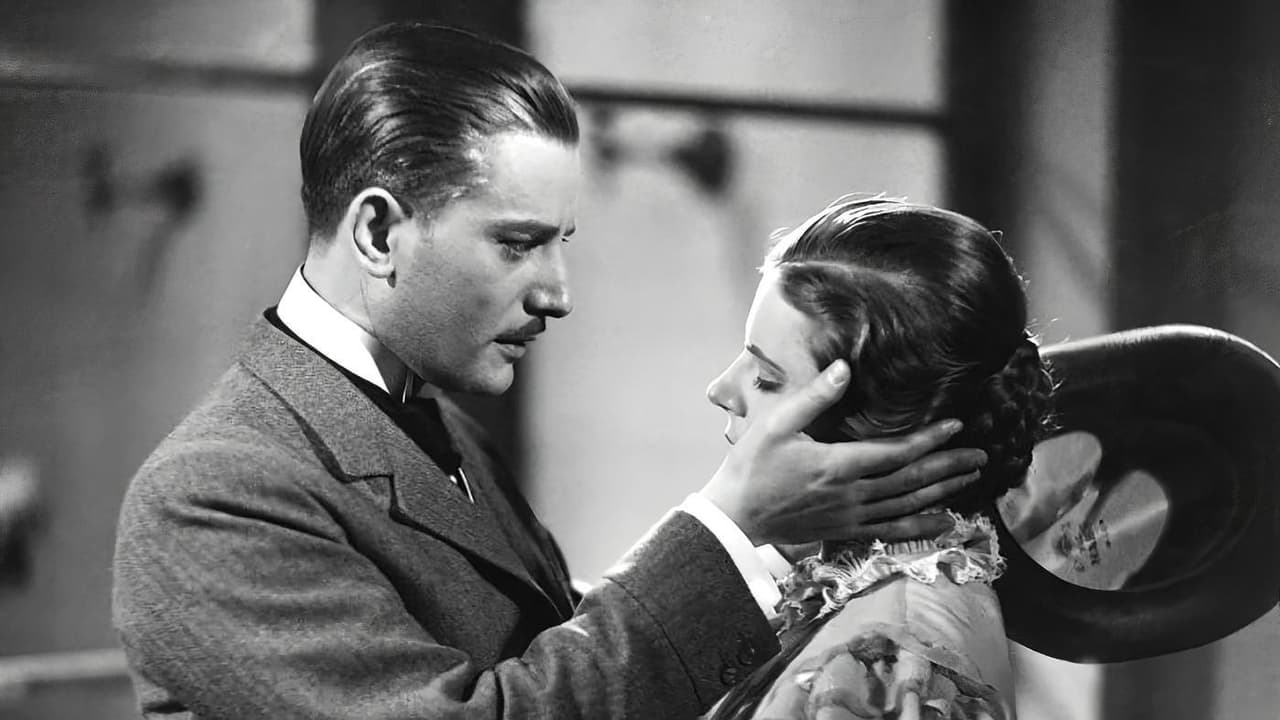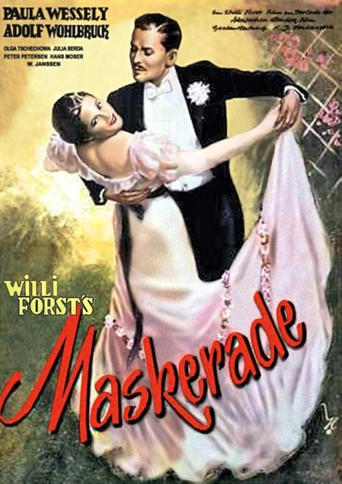FrogGlace
In other words,this film is a surreal ride.
KnotStronger
This is a must-see and one of the best documentaries - and films - of this year.
Zandra
The movie turns out to be a little better than the average. Starting from a romantic formula often seen in the cinema, it ends in the most predictable (and somewhat bland) way.
Karlee
The joyful confection is coated in a sparkly gloss, bright enough to gleam from the darkest, most cynical corners.
Horst in Translation (filmreviews@web.de)
I cannot agree at all with the reviewer who wrote that he had seen thousands of films and that this one is the best. "Maskerade" or "Masquerade in Vienna" is an Austrian German-language film from 1934, so this one is already over 80 years old and it is from the early days of sound films still. But this is also almost the only positive achievement I can mention about this movie. The writer and director is Willi Forst, one of the most prolific and successful Austrian filmmakers of his time. But his effort here does not get me interested in checking out more of his works. The cast includes a handful actors who were successful and prolific too back then, but the performances are all mediocre at best and the script is so-so as well. I cannot say I cared a lot for any of the protagonists and I did not find the film funny either although there are many sequences where it attempts to be. Same can be said about the romance aspect. In general, this film lacks expertise and a defining touch in most areas. I do not recommend the watch. The only maybe good thing is that it is not Nazi propaganda despite being from 1934.
Larry41OnEbay-2
If I was stuck on a desert island with only one film... this would be it. Considered the pinnacle of '30s Austrian cinema, Maskerade embodies much of the best of 30s European filmmaking, in which the camera dances to a distinctly musical rhythm of movements and countermovements. It sits comfortably among the '30s films of Rene Clair, Max Ophuls and Jean Renoir, as well as Ernst Lubitsch's work in Hollywood. Compared to most of those films, its topic may seem relatively fluffy: an artist creates a minor scandal by painting a masked nude suspected to be an aristocrat's fiancée; when he names an innocent girl in an attempted cover-up, it leads to unexpected romantic entanglement. Willi Forst takes a well-worn continental costume milieu as a starting point, doing everything he can to breathe life into it. The camera darts with ease through ballroom scenes, connecting the eyelines of characters as they scope each other's movements. He laces the film with clever tricks both visual (dialogues filmed in silhouette) and aural (a montage of citizens making animal sounds while reading the gossip pages). Driving everything is a buoyant soundtrack of 19th century waltzes and opera, whose lilting rhythms can be found in the film's pacing even when the music subsides. The film itself feels like a symphony of varied movements: robust allegros, minuet-like montages, and a climactic rondo that brings everything to full circle. Overall, life is presented as an irresistible society ball, governed by status, gossip and decadent desire.
Marcin Kukuczka
"Proud of my achievements? Being humble is all that is left to me in this." (Paula Wessely) MASQUERADE IN VIENNA from the screen play by Walter Reisch is, undeniably, the most famous film that stars Paula Wessely, the actress whom Sir Laurence Olivier appreciated as a film actress among the greatest ones of the twentieth century, whose performances were studied by Bette Davis. And indeed, her captivating performance in MASQUERADE constitutes a significant factor why the film is so much worth viewing and recently released on DVD. Yet, before some deeper consideration of her charming portrayal, let me address some other aspects that make this movie a pinnacle of both Austrian and European filmmaking.Willi Forst's movie is one of these cinematic treasures that appears to be clear, entertaining, artistic and respectful towards viewers. Actually, much of its charm we owe to Willi Forst and Walter Reisch, two people who had a decisive presence in the Austrian cinema of that time. After Forst's debut LEISE FLEHEN MEINE LIEDER about the composer Franz Schubert, MASQUERADE brilliantly combines the lovable comedy with some dramatic tensions, presents to us the atmosphere of Viennese society and within... a story of an unexpected feeling between two people who met in the most unpredictable circumstances and who overcome all and breathe life into everything, including the coldest conventions. The movie clearly manifests a unique genre that is to be called a Wiener Film and explores the undeniable talent of Mr Forst, one of the greatest directors who came from Austria except for Billy Wilder. Robert Von Dassanowsky nicely refers to this director in his book AUSTRIAN CINEMA seeing him (Forst) as "one of its greatest filmmakers...and one more casualty from the negligence that has greeted Austrian cinema since the 1950s" (p.49).The whole atmosphere of the film can boast of truly innovative camera-work that appears remarkable in many memorable moments and Franz Planer's cinematography. It stirs and teases viewers' attention in a captivating manner. There is wit and symbolism. Consider the hilarious moment of how people read and spread a gossip...with animal sounds. Moreover, the number of juxtaposing images together with certain close-ups (including feet and steps), the static camera at ball scenes, the lighting on Paula Wessely's face as well as some highlighted pieces of wardrobe (a chinchilla muff that plays a decisive role in the storyline) are only some of the significant visual merits. Some moments are so beautifully photographed that you can hardly find something equal elsewhere. What I mean here are three scenes: the mask ball, the tea party at Fuerstin and the blissful finale (not to spoil much... just consider the use of snow). A bonus for curiosity and entertainment is added by Enrico Caruso's voice recorded on soundtrack. However, let me now refer to, perhaps, the crucial virtue of MASQUERADE - performances or rather the Performance of PAULA WESSELY.I have discovered Ms Wessely thanks to my friend and MASQUERADE was my first encounter with this wonderful Viennese actress. I was overwhelmed by her performance. Yes, after all these years, she still enchants us and still touches us. Why? Because her role of one Miss Leopoldine Dur (a name picked randomly and hilariously) is so genuine and her performance so heartfelt. She convincingly portrays 'Die Kleine Person' (a little person) who barely represents the glamor of the high society; yet, a young person who once starts to believe in herself and pushes through to meet her destiny. 'Can an artist find any inspiration in a kind of person I am? A shy little innocent person while there are so many prettier ones? Why me? Actually, WHY NOT...ME? The character partly resembles Ms Wessely herself who wins our hearts not by the distance and self-respect but openness and respect towards others, towards people, her viewers she has always searched...and found. Besides her scene at the mirror that appears to be a sort of turning point for the entire story and, particularly, for her character, her best scene includes the innocent entrance into the artist's studio with quite different expectations than what she found out, actually and scenes she plays opposite Olga Tschechowa near the final moment.Other cast constitute no lesser effect. While Wessely's leading man Anton Walbrook as Heideneck does not captivate us to the extent we would, perhaps, wish...their scenes are worth consideration. Among many, it is foremost the lovely waltz scene that has become, in a way, a landmark of the film, much due to the aforementioned excellent camera-work. Mr Walbrook, if not a captivating leading man for Wessely, occurs to be acceptable at least. From the supporting cast, the performances that deserve highest attention are: Peter Petersen's Professor Carl Harrandt whose pride has to face doubts, anger and compassion; Walter Janssen's court opera director whose wit makes for the crucial humor of the script; Hilde Von Stolz's sweet blonde Gerda whose interest is directed solely onto the artist rather than art; Julie Serda Junkermann's Fuerstin M. who is only capable of looking at 'good old times' not seeing the positive events that may happen in the times of her elderly life; Hans Moser as Herr Zacharias with his Viennese accent and some typical wit that appears to be a sort of irreplaceable entertainment. Finally, it is Olga Tschechowa whose villainous intrigues make for an unexpected climax of events. Indeed, the muff was there for...something...MASQUERADE is a highly recommended film, a milestone among Austrian cinematic achievements, a beautiful story of love where the mask of all social jealousy, strict conventions and anger give in before the genuine feeling which makes all things as pure as snow. But MASQUERADE, for me, constitutes yet another pearl, something more than just a great film...a loving memory of Paula Wessely whom people still discover though she is with us in a different way.
pf9
Not quite what the legend surrounding it would lead you to believe, "Maskerade" is a quite predictable movie in a Schnitzlerian mode, stylistically akin to any of a number of better Max Ophuls movies of its time (e.g. "Liebelei", "La Signora di Tutti"), not to speak of such later Ophuls masterpieces as "La Ronde" or "Madame de". Willi Forst quite engagingly presents the social life of turn-of-the-century Viennese high society, much as quite a number of the characters he brings into play are stereotypes and character development seems to be outside his range.The great Paula Wessely, an actress with few peers on the stage --- Edwige Feuillère and Laurette Taylor come to mind --- does what is a routine job as a predictable goodie-two-shoes character. On stage her voice was unforgettable (I saw her live once at the Burgtheater and once at the Akademietheater), the kind of voice you would love to listen to even in a reading of the Vienna phonebook. In this movie her splendid voice is not yet fully developed, but admittedly "Maskerade" was made when Wessely was still in her twenties. Moreover, though touched with a considerable amount of Viennese charm, Wessely was never quite a classic beauty like Isa Miranda, Ophuls' Signora, or Audrey Hepburn who would have made an excellent Leopoldine Dur.Hans Moser does his shtick here like in any other Hans Moser movie, but without anything specific to set this supposed masterpiece above routine.In retrospect, the funniest thing maybe is, that Olga Tschechowa, an undistinguished actress with good, though hardly very good, looks, afflicted by an unmistakable frigidity, was revered in the German-speaking world of her time (the Thirties) as some exotic femme fatale.In the role of the dowager, the respectable Julia Serda pales in comparison with say Dame Edith Evans, the doyenne of moviedom dowagers. The Serda character's "In my days things were more exciting" gimmick goes well once, or even twice, but by the time it is getting to be repeated over and over, one feels that Forst is catering to the taste of some Viennese grannies and not to the needs of a movie of genuine integrity.On the whole, the rather far-fetched story still manages to flow quite well. "Maskerade" entertains, but it also disappoints.

